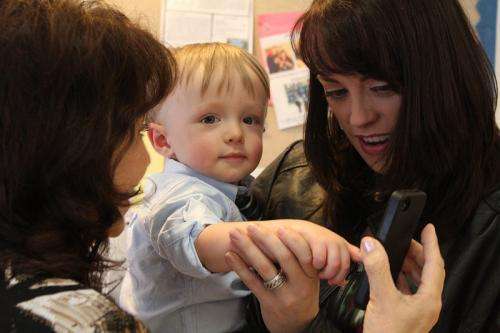The growing trend of parents who entertain young children with touchscreen devices

While laptop and PC keys and mouses have been too difficult for children under six to negotiate, they can now turn on their parents' touch screen devices, then touch and swipe their way to their favourite apps.
Known as the pass-back effect, parents are now passing their own devices to their very young children.
There is an absence of figures about very young Australians' touchscreen use.
However, a quarter of UK children aged between three and four use tablets. In the US 40 per cent of under eights use tablets and 38 per cent of under twos have used a touch screen device.
But what is actually happening in the lives of real Australian families?
Techo-guilt
While many parents are passing-back their touch screen devices to their toddlers and pre-schoolers to use, they (the parents) are not altogether at ease with the practice.
For all but the most self-assured parent, letting their youngsters use their smartphones and touch screen tablets has become yet another area where they can be subject to criticism or negative evaluation from others.
These parents have moved into a highly charged arena where conservative child rearing beliefs tend to dominate.
Taking direction from the American Academy of Paediatrics (AAP), many health, education and psychology experts recommend that children under two years should have no screen time whatsoever (including background television).
They also recommend children over two should spend no more than one to two hours per day consuming screen-based entertainment.
This advice is based on older studies regarding television usage with no differentiation made between passive television viewing (or video clip watching on Youtube) and more interactive games and activities available—despite emerging research that indicates there is difference.
In addition to this, the subject is gaining some media attention (iTantrum latest trend for toddlers (Dec 27, 2013) The craze for tablets and smartphones is spreading (Oct 30, 2014) and (iBubs turn into techno toddlers (Nov 18, 2011)).
This type of commentary, which is almost always negative, can add to parents' sense of guilt (techno-guilt) about their youngest children using digital screens.
The new pacifier
Often thought of as the new pacifier, touch screen tablets and smartphones are used as part of parents' collection of possible parenting tools.At the same time, however, parents can feel a sense of shame or guilt about using technology to occupy or distract children, especially when it happens in public.
This techno-guilt sees parents using technology when all other options have been used up. For instance, when trying to keep their toddlers occupied in constrained situations such as eating in a restaurant, waiting at a doctor's surgery or long car rides.
Conversely, parents also want to help their children gain the digital skills necessary to play, learn and grow up in a digital world.
Their child-rearing practices are being shaped by the realities of our post-industrial information society.
These tensions, between parents' own perceptions and expert advice, are now being played out in parenting blogs, discussion groups and online magazines:
On the one hand, parents want their children to swim expertly in the digital stream that they will have to navigate all their lives; on the other hand, they fear that too much digital media, too early, will sink them. Parents end up treating tablets like precision surgical instruments, gadgets that might perform miracles for their child's IQ and help him win some nifty robotics competition—but only if they are used just so (Rosin, 2013).
Lack of realistic advice
There is a shortage of realistic parental advice and guidelines around zero-to-five's internet use: and little commentary that differentiates passive television viewing from the variety of interactive, app-based activities available for toddlers and pre-schoolers.
With no past history to draw on or solid research data as guidance, parents are looking for reasonable discussion about how to use touch screens in a constructive and safe manner.
At this stage, therefore, parents are working it out as they go—relying on their own experiences and the experiences of their friends and family.
In the lives of their children it seems that it has always been possible to touch and swipe their way into games, books and creative and communicative experiences. To their parents the changes have a significant impact on what it means to parent a pre-school child.
More information: "Do television and electronic games predict children's psychosocial adjustment? Longitudinal research using the UK Millennium Cohort Study." Arch Dis Child DOI: 10.1136/archdischild-2011-301508
















